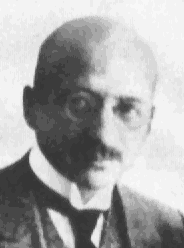“Of the great things which I’ve experienced in the world, the content of their life
and work takes the deepest effect.”
Fritz Haber to Albert Einstein to his 50th birthday, March 1929
Short life history: Fritz Haber
* December 9, 1868 Wroclaw, † January 29, 1934 Basle
The German chemist Fritz Haber obtained a doctorate in Berlin in 1891, after his studies in Berlin and Heidelberg, interrupted by his voluntary one-year military service. It was followed by “years as an apprentice” in industry before he went to Zurich for a short stay at the Polytechnic School (the later Swiss Technical College, ETH) and later to Jena. In 1894 began the time in Karlsruhe for Haber as assistant at the Technical College where he qualified as university lecturer in 1896 with a work about the combustion of hydrocarbons. In 1898 he became associate professor for physical chemistry at the Technical College and took over the management of the Institute for physical chemistry in 1906, after his becoming full professor. In 1911 he went to Berlin as head of the newly founded Kaiser-Wilhelm-Institute for Physical Chemistry which he lead until his emigration to England (1933). Due to his Jewish roots Haber felt himself ever more under pressure by the national socialists so that he resigned office in 1933 and left Germany. In 1915 his wife, the chemist Clara Immerwahr, committed suicide.
Haber belonged to the circle of scientists that called Einstein to Berlin in 1914. A considerate and friendly relationship developed between the two men.

At the beginning of World War I Haber made his work capacity available to the highest army command. He introduced poison gas (April 22, 1915 first German poison gas attack at Ypern, Belgium) and worked in the development of gas protection devices. Among other things he dealt with works about electrochemistry, the thermodynamic of gas reactions and the flame chemistry, such as flame reactions and combustion processes). Later he worked also in the area of pest control. Furthermore he undertook experiments to extract gold out of sea water. But he didn’t succeed. For the year 1918 he received “…for his method of the synthesis of ammonia out of the elements nitrogen and hydrogen…” the Nobel Prize for chemistry. The artificial fertilizer produced by this process (Haber-Bosch-process) is nowadays still an important factor in human nutrition.
From the beginning 20ies until his emigration Haber has also worked hard for the promotion of science in Germany (German Research Foundation). Furthermore he made a big contribution to the foundation of the “Japan-Institute” whose task was to promote the scientific relations between Germany and Japan.



 DEUTSCH
DEUTSCH